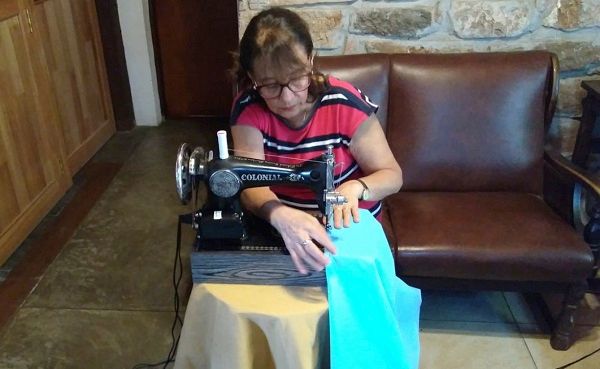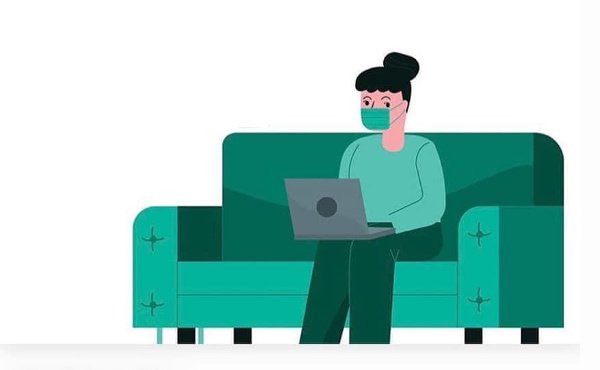A recent graduate, her life upended by the coronavirus outbreak while taking her first steps in the professional world, reflected on this period when many of us are obliged to stay at home and cannot move. She told her friends: "We carry our treasure inside us, and it cannot be locked up behind four walls."
Shortly after his election as Prelate of Opus Dei, Mons. Fernando Ocáriz invited us to cultivate the "creativity of charity.” (Pastoral Letter, 14 February 2017, no. 31) The following stories show how creativity and a passion for doing good can cut through walls and cross over oceans. Although we are confined, our eagerness to help others cannot be.
1. #AStitchInTime
Tucha lives in Rivera, a city in northern Uruguay, where, a few days ago, she received a WhatsApp message from a friend. There were no cases of coronavirus in the area yet, but the Ministry of Public Health was asking for volunteers to sew scrubs for health workers, anticipating that they might need more than they could get.
Although she had not used her sewing machine for several years, she decided to volunteer. "A doctor came to my house and brought the light blue TNT cloth, garters for the cuffs, and a pattern. That visit came as a surprise: she was the pediatrician who took care of my six children, whom I hadn't seen for a long time!" The doctor told her that she had recognized Tucha’s voice when she called to volunteer.
The Ministry of Public Health was asking for volunteers to sew scrubs for health workers.
With the material ready, Tucha tried to turn on her sewing machine, but it had been in storage for a long time and didn't work. The belt was broken and the engine was overheating; she could actually see sparks inside. Her husband, Miguel, joined in to help. He dismantled the machine, fixed the engine, and made a new belt from leather they had in the house. It was perfect. Tucha started sewing and, when she finished the first suit, Miguel tried it on for fitting: teamwork!
After hours of sewing, Tucha commented: "The work was all new and I was very nervous. Every step in making a scrub suit was like a mountain before me, but I thought of Jesus and offered it to Him. I also asked my guardian angel for help and thought of Saint Josemaría, who taught us that with little things we can do something great, and in that way we can become saints!

2. #EverythingWillBeALRIGHT #CoronaUseItDon'tLoseIt
Also in Uruguay, in an interview that was broadcast on national TV, María Jose explained a new project she’s started with some fellow psychologists and psychiatrists: psychological consultations by telephone, free of charge, in order to help those struggling with isolation while they have to stay home.
María José is married and has four children. She specializes in positive psychology and family therapy, and runs an association called Strong Youth, which promotes youth formation through virtue and skill development. She and another friend produce a podcast on Spotify about positive psychology called “Sé feliz, deja huella” (“Be Happy: Leave a Mark.”) Episodes include “The family challenge to confront the coronavirus” and “Anxiety in times of uncertainty.”
During the television interview mentioned above, she offered some tips on how to cope with spending many days without leaving the house. It is normal to be more anxious and uncomfortable in these circumstances, but she explained that the key is “not to focus on this,” but rather to “develop healthy habits.” She highlighted the importance of having a schedule and engaging in activities aimed at something specific, like exercising or participating in religious services online.
Maria José, a pyschologist, offers consultations by telephone, free of charge, in order to help those struggling with isolation while they have to stay home.
María José also talks about the importance of social closeness, even when we are physically distanced, especially with those who live alone: “Today we are seeing excellent initiatives of solidarity. This is good for many people and is very good for those who help. It is important to be open to others, to make phone calls, send messages, and care for others. Even when I am having a hard time, I see that there are other people struggling, perhaps having a harder time than me, and they need my help. So I take care of myself as well as the others."
Gaby and Marie had a similar idea to Maria José’s, but aimed at young people. They live in New York, where the pandemic has been particularly aggressive. When the U.S. government mandated staying home, they started thinking about how to make the lockdown useful and to produce positive content in English. So began “Corona: Use It, Don’t Lose it,” a podcast series featuring young people who are trying to make the most of the unique situation caused by the pandemic. In each episode, students from different parts of the country share advice: how to cultivate friendships, spend more time reading, learn to adapt to online classes, stay motivated, have a good sense of humor...
3. #LettersWithSoul #COVIDletters
Veronica, coordinator of the NGO “Impulso Social” in Argentina, noticed that many of the organization’s usual volunteers were finding ways to help those affected by the pandemic, even though they couldn’t leave home. They began by helping out in their own home, cooking, helping their siblings with homework, and trying to keep up everyone's morale… But they wanted to help more, and, once again, technology allowed them to do so.
The mother of one of the volunteers told them about an initiative going on in Spain, where the pandemic had arrived weeks earlier and was very aggressive. They contacted Cristina Marin Campos, a surgeon at the Hospital de La Princesa in Madrid who started the “Letters with Soul” campaign. This involves people writing letters of encouragement, and the hospital staff delivering them to COVID-19 patients.
"We used to work more with individual volunteers, but now that everyone is in the same house, all the family members are getting involved."
Many students who collaborate with Impulso Social joined, writing letters from different cities in Argentina. In each letter, the writers introduce themselves, cheer on the patient, and provide an email address so the recipient can reply. Their affectionate letters cross the Atlantic, allowing the volunteers to accompany those who are isolated. According to Veronica, "These initiatives play a very important role in this quarantine, especially among families. We used to work more with individual volunteers, but now that everyone is in the same house, all the family members are getting involved. When we started the letter initiative, many people asked us, ‘Can my dad, mom, and sister participate?’ This pandemic will leave us with something good, because in future emergencies, there will be more people to help.” (You can learn more about the NGO and about this project on Instagram.)
A similar activity has been set up in Monterrey, Mexico, where a group of university students and young professionals have created the @apadrinaonline account, meant to accompany people affected by COVID-19 through prayer, encouraging messages, and virtual presence. In addition to writing letters to the sick, they help health workers by praying for them, sending them messages, and taking care of some small errands (through home delivery services). They also care for elderly people, who they call over the phone. In one week, they wrote to 14 patients, "sponsored" 218 health sector employees, and accompanied 326 sick and elderly people.

